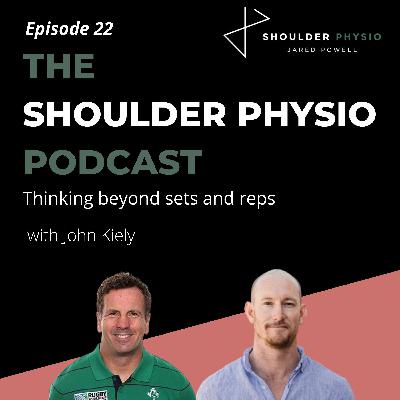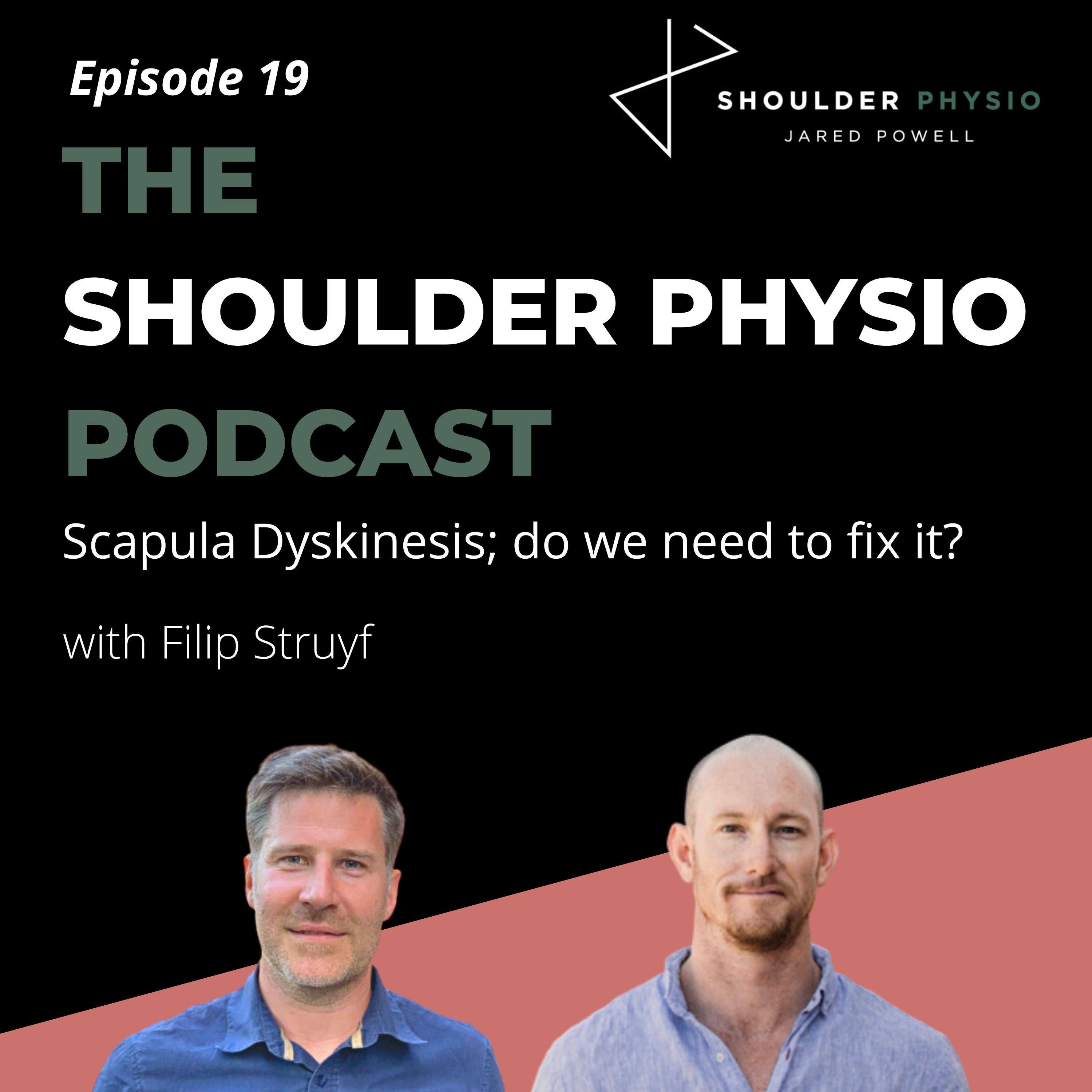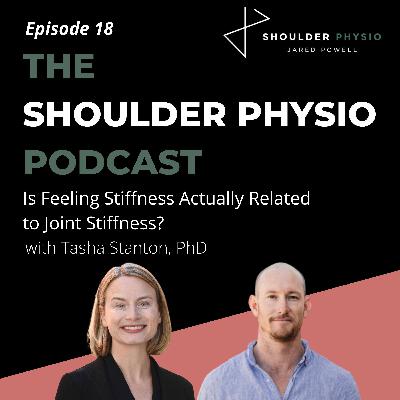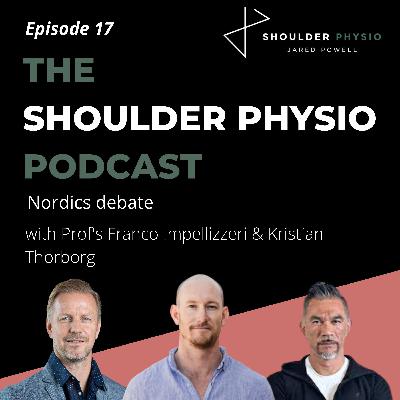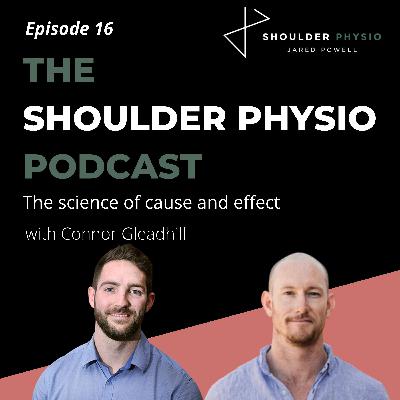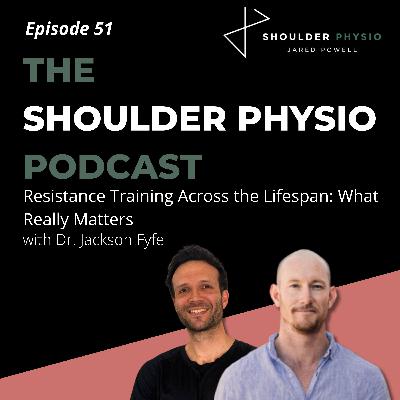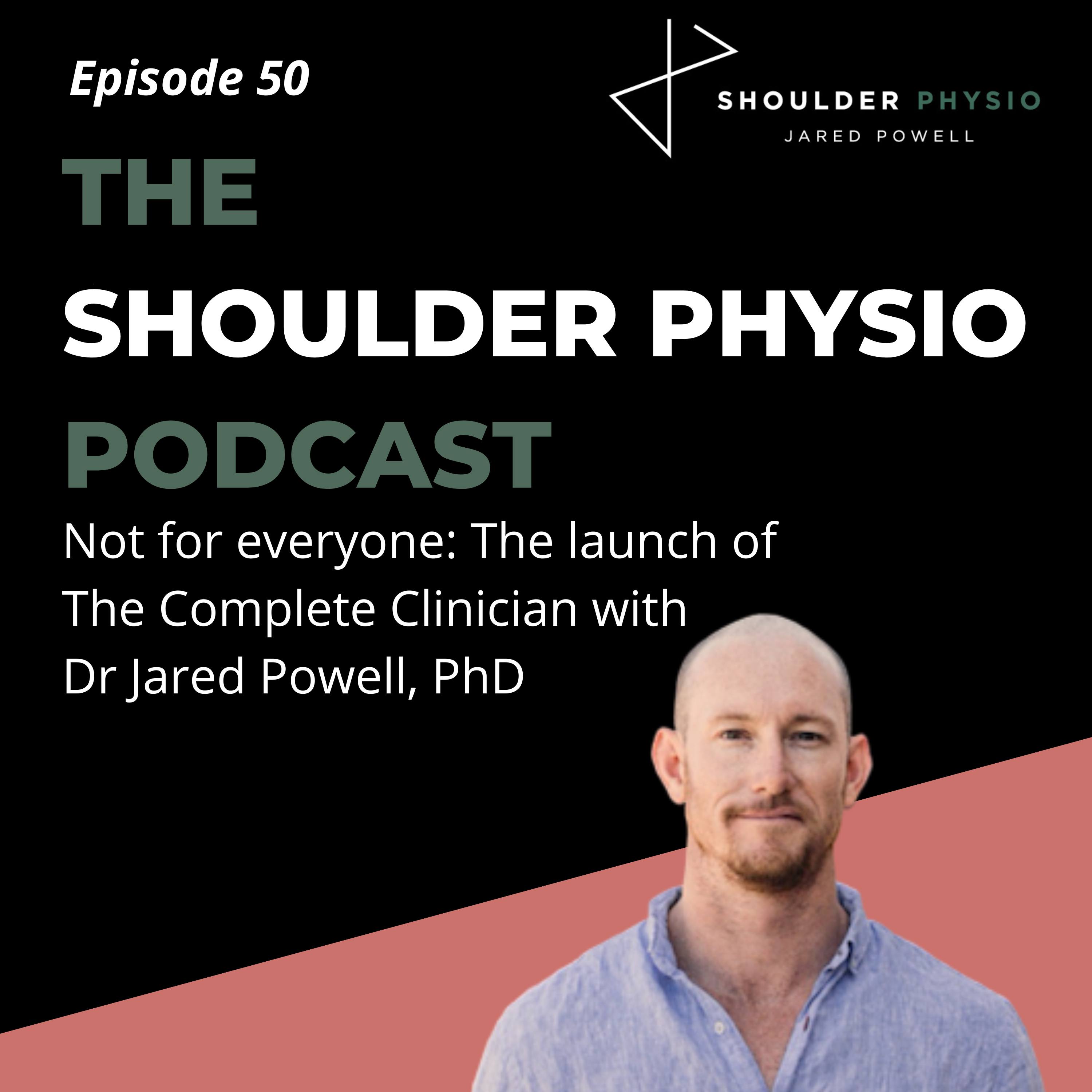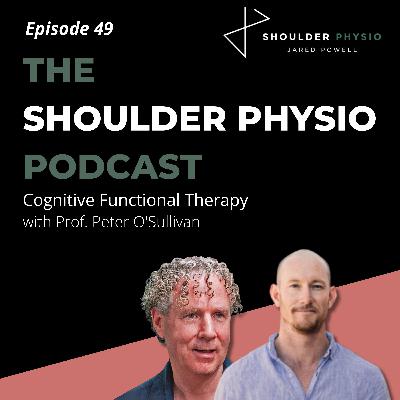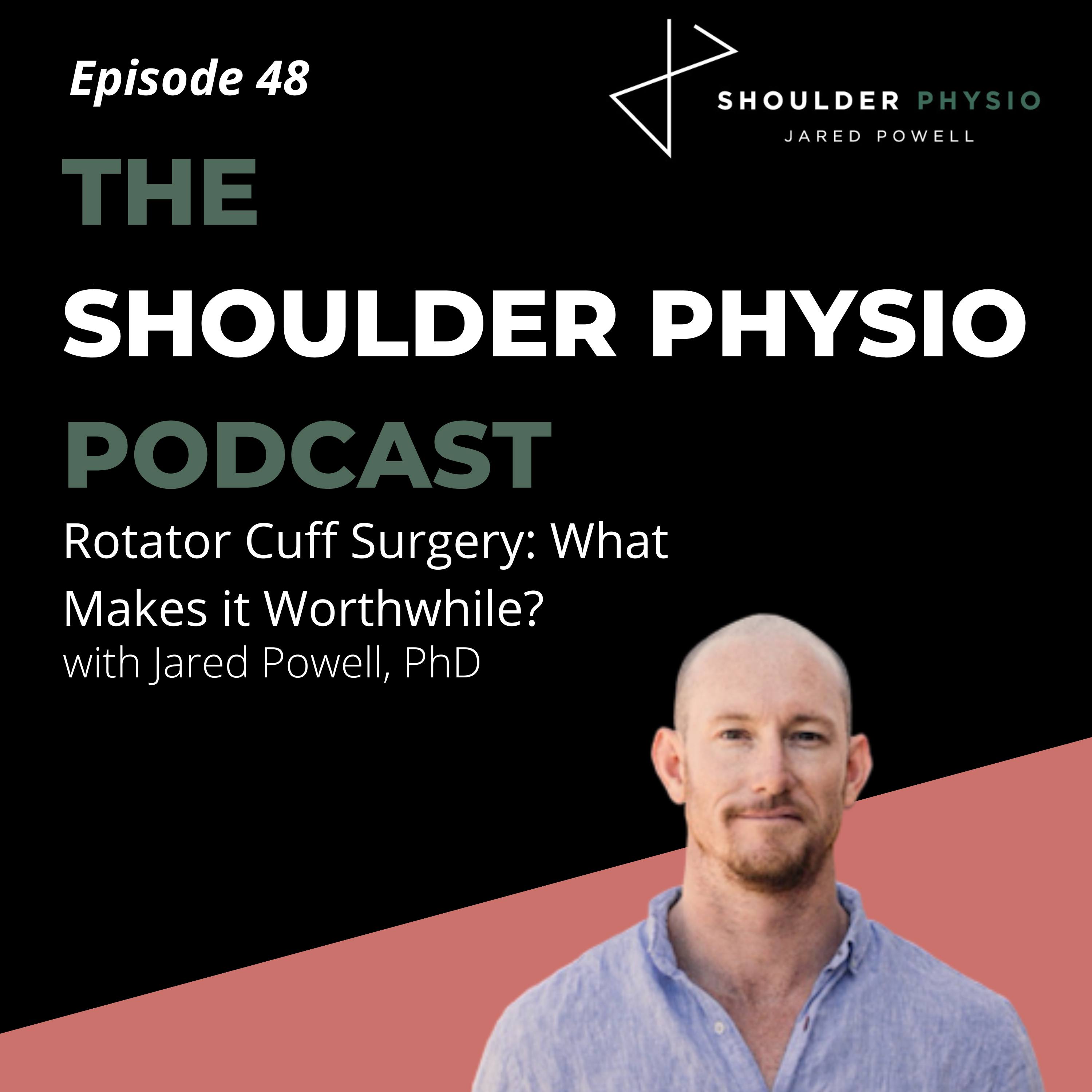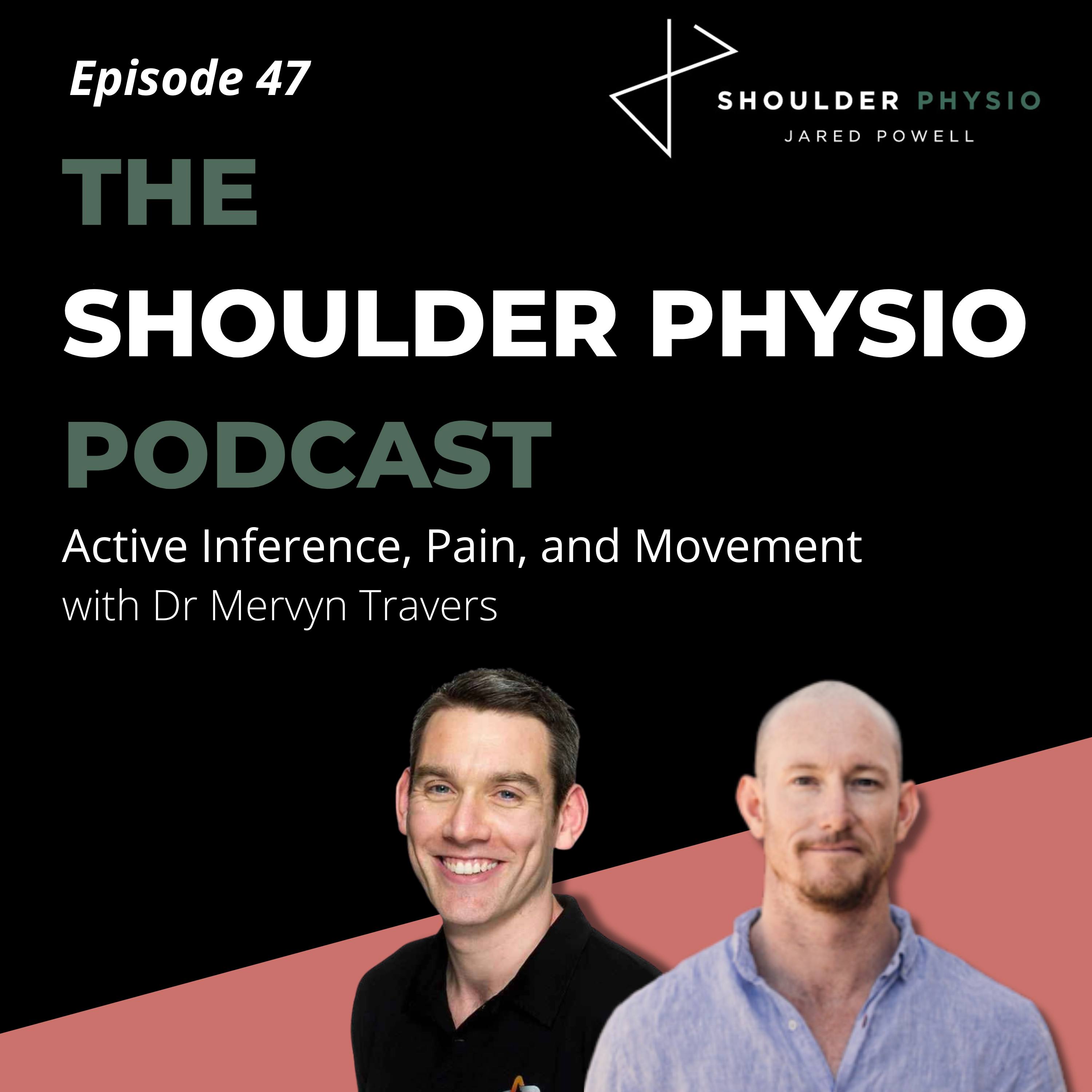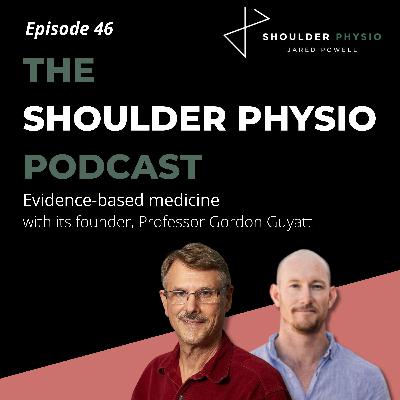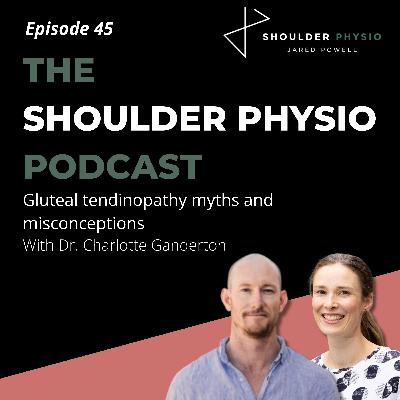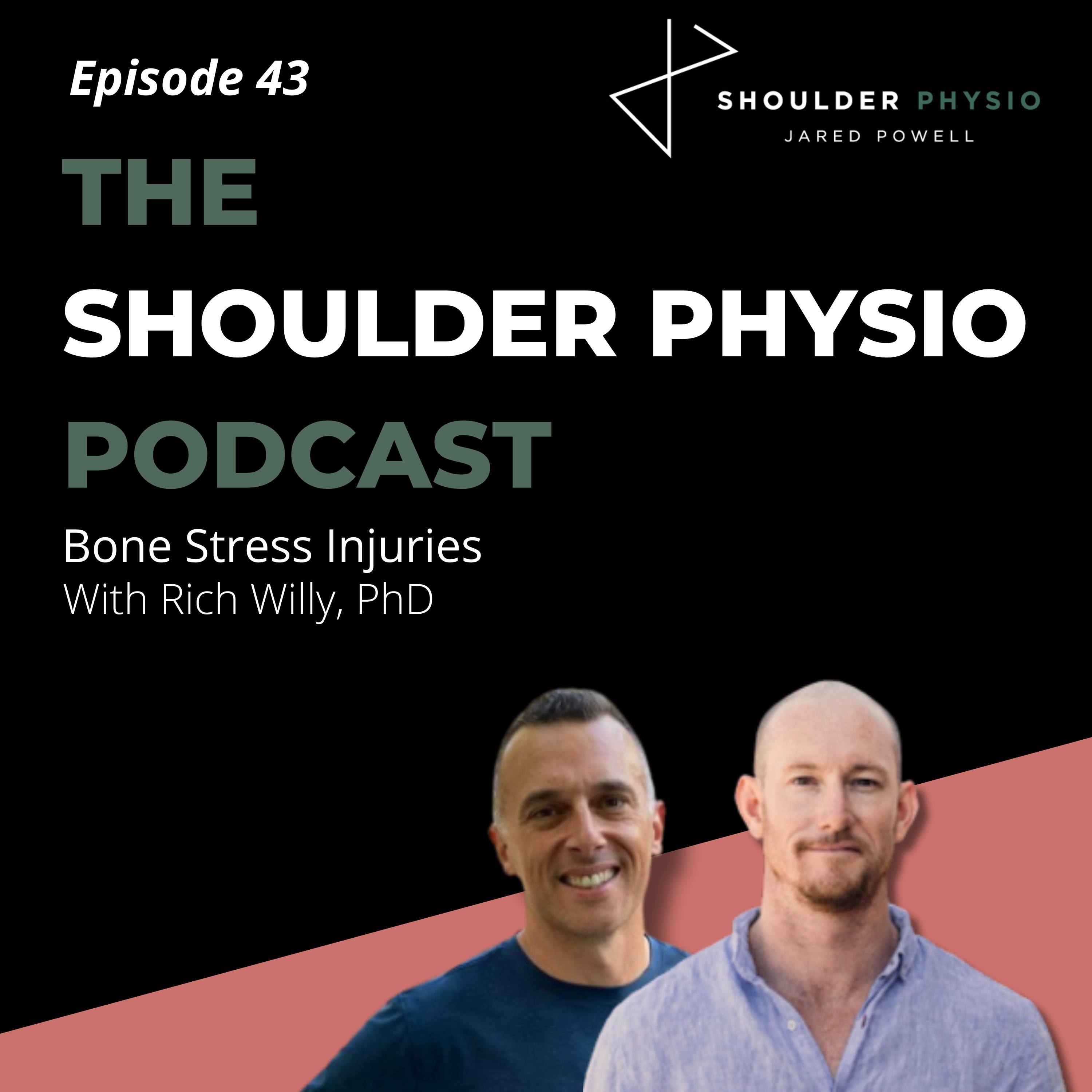Discover The Shoulder Physio Podcast
The Shoulder Physio Podcast

51 Episodes
Reverse
Tendinopathy: Is it a simple case of tendon overload that can be fixed with eccentric exercise or friction massage? What's the deal with inflammation? Is there a role for adjunct therapies such as biologics and medications? Can physios, surgeons and sports physicians ever get along when it comes to managing tendinopathy? My guest, Professor Neal Millar is here to let you know.
Key papers:
Millar et al 2021: Tendinopathy
Cook and Purdam Continuum Model of Tendinopathy
Rees et al 2014: Tendons--time to revisit inflammation
Millar et al: Interleukin 17A– a Translational Target to Treat Supraspinatus Tendinopathy
Connect with Jared and Neal:
Jared on Instagram: @shoulder_physio
Jared on Twitter: @jaredpowell12
Neal on Twitter: @tendonglasgow
Cliniko free trial, click here!
See our Disclaimer here: The Shoulder Physio - Disclaimer
Strengthening exercise is a popular and effective treatment for shoulder pain. But...is the benefit of strengthening exercise derived from getting stronger or are there other causal mechanisms underpinning the effect? Listen to find out!
Key papers:
Powell and Lewis 2021: Rotator Cuff–Related Shoulder Pain: Is It Time to Reframe the Advice, “You Need to Strengthen Your Shoulder”?
Lewis and Powell 2022: Should We Provide a Clinical Diagnosis for People with Shoulder Pain? Absolutely, Maybe, Never! The Ongoing Clinical Debate Between Leavers and Retainers
Hotta et al 2022: Causal mechanisms of a scapular stabilization intervention for patients with subacromial pain syndrome: a secondary analysis of a randomized controlled trial
Messier et al 2022: Effect of High-Intensity Strength Training on Knee Pain and Knee Joint Compressive Forces Among Adults With Knee Osteoarthritis: The START Randomized Clinical Trial
Connect with Jared:
Jared on Instagram: @shoulder_physio
Jared on Twitter: @jaredpowell12
Cliniko free trial, click here!
See our Disclaimer here: The Shoulder Physio - Disclaimer
Can we prevent injuries from happening? All of them? If we can't prevent ALL injuries should we move away from using the term prevention? Or is all this boring and irrelevant linguistic games that don't move the needle for clinical practice? I for one am fascinated by this discussion and I reckon you will enjoy it too. Franco, as always, has the ability to cut through fluffy opinions and statements with hardcore and unabashed science and I love it!
Key papers:
Prevention versus Risk Reduction or Mitigation
Connect with Jared:
Jared on Instagram: @shoulder_physio
Jared on Twitter: @jaredpowell12
Franco on Twitter: @francoimpell
Cliniko free trial, click here!
See our Disclaimer here: The Shoulder Physio - Disclaimer
In this solo episode I discuss the evidence underpinning the use of platelet rich plasma injections for shoulder pain. Platelet rich plasma makes total sense on the surface, but do empirical findings support this? Should we continue down the pathway of research for platelet rich plasma, or move on? Should you recommend it in your practice? What do you say if a patient asks you about it? These are some of the topics we tackle in this short primer on platelet rich plasma for shoulder pain. I hope you enjoy.
Key papers:
Platelet rich plasma: from basic science to clinical applications by Foster et al 2009
Efficacy of Platelet-Rich Plasma for the Treatment of Interstitial Supraspinatus Tears by Schwitzguebel et al 2019
Efficacy of Platelet-Rich Plasma for the Treatment of Interstitial Supraspinatus Tears: A Double-Blinded, Randomized Controlled Trial
Treatment of Subacromial Impingement Syndrome: Platelet-Rich Plasma or Exercise Therapy? A Randomized Controlled Trial
Connect with Jared:
Jared on Instagram: @shoulder_physio
Jared on Twitter: @jaredpowell12
Cliniko free trial, click here!
See our Disclaimer here: The Shoulder Physio - Disclaimer
In this episode I speak with eminent sport scientist and coach, John Kiely. John is infamous for challenging dogmatic training principles in sport science, chiefly periodisation theory. Our conversation starts with periodisation theory and then goes to some interesting locations, stopping momentarily at homeostasis, allostasis, general adaptation syndrome (GAS), predictive processing, the biomedical model, sets and reps and much, much more. If you prescribe exercise in any way, shape or form, please listen to this episode with the venerable John Kiely.
Key papers:
Periodisation theory: Confronting an inconvenient truth
Periodisation paradigms in the 21st century: evidence-led or tradition-driven?
Uncertainty and stress: Why it causes diseases and how it is mastered by the brain
Psychological factors are associated with the outcome of physiotherapy for people with shoulder pain: a multicentre longitudinal cohort study
Connect with Jared:
Jared on Instagram: @shoulder_physio
Jared on Twitter: @jaredpowell12
John on twitter: @simplysportssci
Cliniko free trial, click here!
See our Disclaimer here: The Shoulder Physio - Disclaimer
An entrenched assumption in sport and exercise medicine/physiotherapy, going back decades, has been that ACL (anterior cruciate ligament) injuries DO NOT heal. Not ever. However, like many dogmatic beliefs in the health and fitness sector, this assumption appears to have been seriously wrong. Dr Stephanie Filbay joins me to discuss her latest paper about the healing capacity of the ACL and what this means for your clinical practice. Dr Filbay also teases some insights from the CROSS bracing trial, which is soon to be published. Be prepared to have some of your most tightly held beliefs seriously challenged in this episode.
Key papers:
Dr Filbay et al 2022. Evidence of ACL healing on MRI following ACL rupture treated with rehabilitation alone may be associated with better patient-reported outcomes: a secondary analysis from the KANON trial
Dr Filbay Lancet paper Surgery or rehabilitation for anterior cruciate ligament injury: where are we now?
The KANON trial by Frobell et al 2010
Stay tuned for the Cross Bracing Method Trail....
Connect with Jared:
Jared on Instagram: @shoulder_physio
Jared on Twitter: @jaredpowell12
Steph on twitter: @stephfilbay
Cliniko free trial, click here!
See our Disclaimer here: The Shoulder Physio - Disclaimer
Osteoarthritis (OA) is a leading cause of pain and disability. OA is also seems to be associated with several myths and misconceptions about how it is caused and how it might be managed. To cut through some of this mythology, I invited Professor David Hunter on the show for a 'no holds barred' conversation. David is the number 1 ranked expert in the world on OA, so it should come as no surprise he is a wealth of knowledge and a clear communicator on the complexities of osteoarthritis. I hope you enjoy.
Key papers:
The START trial for knee OA
The IDEA trial
David's Lancet paper on OA
Connect with Jared:
Jared on Instagram: @shoulder_physio
Jared on Twitter: @jaredpowell12
David on twitter:@ProfDavidHunter
Cliniko free trial, click here!
See our Disclaimer here: The Shoulder Physio - Disclaimer
In this podcast, I discuss the scapula with Filip Struyf, PhD. Filip is a former guest on the show (episode 2) and I've pulled him back on the podcast to tackle the hard problems as they relate to the scapula. Specifically, in this episode we consider the question: "If we identify a scapula dyskinesis in our physical examination, should we attempt to rectify it?".
Key Resources:
Filip's fabulous 2013 paper here
Connect with Jared and Filip:
Jared on Instagram: @shoulder_physio
Jared on Twitter: @jaredpowell12
Filip on Twitter: @Filip_Struyf
Cliniko free trial, click here!
See our Disclaimer here: The Shoulder Physio - Disclaimer
Feeling stiff is a familiar feeling for all of us. But does feeling stiff mean our joints are actually stiff? Or is there more to it. Tasha Stanton PhD is a clinical neuroscientist who has performed research directly addressing this question. This is a fascinating conversation and I hope you enjoy.
Key resources:
Tasha's paper here
Connect with Jared and Tasha:
Jared on Instagram: @shoulder_physio
Jared on Twitter: @jaredpowell12
Tasha on Twitter: @Tash_Stanton
Cliniko free trial, click here!
See our Disclaimer here: The Shoulder Physio - Disclaimer
The Nordic hamstring exercise has enjoyed mostly good press with respect to injury prevention effectiveness. That is until recently. Professor's Franco Impellizzeri and Kristian Thorborg kindly and clearly join me in conversation to help us understand the evidence for and against this exercise.
Key resources:
Impellizzeri Meta analysis: HERE
Ishoi and Thorborg response: HERE
Van Dyk systematic review: HERE
Connect with Jared, Franco and Kristian:
Jared on Instagram: @shoulder_physio
Jared on Twitter: @jaredpowell12
Franco on Twitter: @francoimpell
Kristian on Twitter: @KThorborg
Cliniko free trial, click here!
See our Disclaimer here: The Shoulder Physio - Disclaimer
I am joined by Connor Gleadhill to discuss causal inference. Connor is a PhD candidate exploring causal inference and is someone who speaks fluently about complex topics (must be the smooth Irish accent!). Causal inference is basically the pursuit of estimating how and why things happen. How do we determine causation - strictly through the randomised controlled trial or can we use observational evidence too? Can causal inference help us navigate a chaotic world?
Key resources:
COMPLEXITY: THE EMERGING SCIENCE AT THE EDGE OF ORDER AND CHAOS
The Book of Why - Judea Pearl
Hernan 2018 paper - The C Word
Connect with Jared and Connor:
Jared on Instagram: @shoulder_physio
Jared on Twitter: @jaredpowell12
Connor's Email: connorgleadhill@gmail.com Connor's Website: http://www.connorgleadhill.physio Connor on Twitter: @CGleadhill
See our Disclaimer here: The Shoulder Physio - Disclaimer
In this episode, Jared Powell is joined by Dr. Jackson Fyfe, exercise scientist and Senior Lecturer at Deakin University, to explore the science and practicality of resistance training across the lifespan.
They unpack everything from how kids can safely lift weights to how older adults can maintain muscle health and longevity. Jackson also shares insights from his research on training dosage, hypertrophy, minimal effective dose, and how resistance and aerobic exercise can (and should) coexist.
This conversation spans from myth-busting (“weights stunt growth”) to deep physiological insights about muscle as an endocrine organ. It’s a clear, evidence-based discussion that reminds us why lifting weights might just be the most underrated health intervention available.
Key topics include:
Why resistance training matters at every age
The health benefits beyond muscle and strength
How little training you can do and still get results
Strength vs hypertrophy, what actually matters?
Combining cardio and lifting: interference or synergy?
The truth about training to failure
Register for The Complete Clinician here
Key papers:
Jackson's profile on research-gate
Connect with Jared and guests:
Jared on Instagram: @shoulder_physio
Jared on X: @jaredpowell12
Jackson on X: @jacksonfyfe
Jackson on LinkedIn
See our Disclaimer here: The Shoulder Physio - Disclaimer
In this episode, Jared announces the launch of The Complete Clinician, a new mentorship and education community for MSK professionals who want more than recycled CPD. He explains why this platform exists, what’s inside, and who it’s designed for. From monthly PhD-level lectures to the Brew & Review journal club, structured learning modules, and The Clinician’s Compass, this is a second education for those who refuse to be average.
Jared also shares a quick update on the upcoming 2nd Edition of The Complete Shoulder, set to release in mid-November, with refined content, updated evidence, and new modules.
Launch Date: October 15Check it out!
Connect with Jared:
Jared on Instagram: @shoulder_physio
Jared on X: @jaredpowell12
See our Disclaimer here: The Shoulder Physio - Disclaimer
In this candid and wide-ranging conversation, Dr Jared Powell is joined once again by Professor Peter O’Sullivan, one of the most influential voices in musculoskeletal care.
Pete unpacks the rationale and findings of the landmark RESTORE trial published in The Lancet, which provides some of the most compelling evidence to date for cognitive functional therapy (CFT) in people with chronic low back pain. He discusses how CFT works, its philosophical divergence from traditional “find-it, fix-it” approaches, and how it centres the patient’s experience, goals, and context.
You’ll also hear:
A simple explanation of the 3 pillars of CFT
The real-world training model used in the RESTORE trial
The importance of behaviour change, flare-up planning, and self-efficacy
What to do when CFT “doesn’t work”
Pete’s reflections on burnout, clinician support, and the importance of community
A behind-the-scenes look at the Evolve Pain Care Academy: a new initiative to democratize pain education globally
This episode is packed with practical insights, personal reflections, and a compelling vision for the future of musculoskeletal care.
Register for The Complete Clinician waitlist here
Key papers:
Listen to me, learn from me. Slater et al 2022.
The RESTORE trial 3 year follow-up
Connect with Jared and guests:
Jared on Instagram: @shoulder_physio
Jared on X: @jaredpowell12
Evoolve Pain Care
Pete X: @peteosullivanpt
See our Disclaimer here: The Shoulder Physio - Disclaimer
In this solo episode of The Shoulder Physio Podcast, Dr Jared Powell explores a deceptively simple question: How much benefit does rotator cuff surgery need to provide to be considered worthwhile?
Jared explores a new 2025 study by Harrison Hansford and colleagues, which uses a clever benefit–harm trade-off approach to quantify what patients actually want from surgery.
This episode challenges the way we interpret research, the limits of "statistical significance," and the need for truly patient-centred decision-making. If you're still recommending surgery after failed physio without asking what makes it worthwhile to the person in front of you, this one’s for you.
Key topics include:
The concept of the smallest worthwhile effect
Is “does it work?” the wrong question?
Shared decision-making and expectation alignment
How the evidence stacks up (or doesn’t)
Why patient-defined outcomes matter more than p-values
Check out the Shoulder Physio Online Course here
Connect with Jared:
Jared on Instagram: @shoulder_physio
Jared on X: @jaredpowell12
See our Disclaimer here: The Shoulder Physio - Disclaimer
In this episode of The Shoulder Physio Podcast, Dr Jared Powell sits down with Dr Mervyn Travers, physiotherapist, S&C coach, and researcher, to explore one of the most compelling frameworks in contemporary pain science: active inference.
They discuss how this predictive brain model helps explain persistent musculoskeletal pain, why traditional exercise-based interventions might miss the mark, and how clinicians can use movement and context to shift a patient’s pain experience. Merv blends philosophy, neuroscience, and clinical pragmatism in a way that's accessible, challenging, and highly relevant.
Key talking points:
What is active inference and how does it relate to predictive processing?
The role of prior beliefs, culture, and clinical language in shaping pain
Movement experimentation as a tool for model updating and recovery
Why it’s time to rethink how we prescribe exercise in pain rehab
Clinical implications from landmark studies within the field that lend themselves to active inference
A call for compassion, curiosity, and nuance in patient care
Check out the Shoulder Physio Online Course here
Connect with Jared and guests:
Jared on Instagram: @shoulder_physio
Jared on X: @jaredpowell12
Merv website: Home - Optimise Rehab
Merv X: @mervtravers
Merv Instagram: @optimise_rehab
See our Disclaimer here: The Shoulder Physio - Disclaimer
In this episode, Jared Powell sits down with Professor Gordon Guyatt, the physician and researcher who coined the term evidence-based medicine (EBM). They unpack the origins of EBM, why it’s often misunderstood, and how it continues to shape modern healthcare.
Rather than being rigid or formulaic, EBM is about integrating the best evidence with clinical expertise and—crucially—patient values and preferences.
🎙 Key talking points:
The surprising history behind the creation of EBM
Why randomised trials matter—and when they’re not enough
How to practice medicine in the face of low-certainty evidence
The role of shared decision-making in everyday care
Why acknowledging uncertainty is a sign of strength, not weakness
How EBM is sometimes misunderstood or misused
What the future holds for EBM—including education in schools
🎧 A must-listen for anyone navigating the grey zones of clinical care.
Key Papers:
Professor Guyatt has too many high impact papers to mention and he has one of the highest H-Index scores in the world (number 13 worldwide and number 1 in Canada). Here is his Google Scholar profile.
Check out the Shoulder Physio Online Course here
Connect with Jared and guests:
Jared on Instagram: @shoulder_physio
Jared on X: @jaredpowell12
Gordon on X:@GuyattGH
See our Disclaimer here: The Shoulder Physio - Disclaimer
In this episode of The Shoulder Physio Podcast, Dr. Jared Powell sits down with Dr. Charlotte Ganderton, a physiotherapist, researcher, and senior lecturer at RMIT University. Charlotte shares insights from her latest research on gluteal tendinopathy, breaking down common misconceptions about imaging, corticosteroid injections, and the infamous clam exercise.
From understanding the role of compression in tendinopathy to discussing effective treatment strategies, this episode is packed with clinically relevant takeaways for musculoskeletal healthcare professionals. Tune in to hear Charlotte’s perspective on how education, exercise, and progressive loading can make all the difference in patient outcomes.
🔹 What is gluteal tendinopathy and how does it differ from other tendon issues? 🔹 Should we rethink the role of imaging and injections? 🔹 Is it finally time to ban the clam? 🔹 Practical treatment strategies for improving patient care.
If you're looking to refine your approach to gluteal tendinopathy, this is an episode you don’t want to miss!
Key Papers:
Grimaldi A, Ganderton C, Nasser A. Gluteal tendinopathy masterclass: Refuting the myths and engaging with the evidence. Musculoskelet Sci Pract. 2025 Apr;76:103253. doi: 10.1016/j.msksp.2025.103253. Epub 2025 Jan 3. PMID: 39854929.
Check out the Shoulder Physio Online Course here
Connect with Jared and guests:
Jared on Instagram: @shoulder_physio
Jared on X: @jaredpowell12
Charlotte on X:@C_Ganderton
Cliniko free trial, click here!
See our Disclaimer here: The Shoulder Physio - Disclaimer
In this episode of The Shoulder Physio Podcast, I am interviewed by my wife, Tara, about my recently completed PhD.
For the past 7 years of my life I have been engaged in a research based PhD investigating the causal mechanisms underpinning the effectiveness of exercise therapy for rotator cuff related shoulder pain. This research program has produced 6 published pieces of research that is contained with the thesis. In this episode I briefly discuss the premise of the thesis, its main findings, and recommendations for future research. I also gives some tips and tricks and to prospective PhD or current PhD students which may help their journey.
Don't miss this episode with myself, Dr Jared Powell, and my wife, the amazing Tara Powell. Buckle up!
Key Papers:
Powell JK, Lewis JS. Rotator Cuff-Related Shoulder Pain: Is It Time to Reframe the Advice, "You Need to Strengthen Your Shoulder"? J Orthop Sports Phys Ther. 2021 Apr;51(4):156-158. doi: 10.2519/jospt.2021.10199. PMID: 33789431.
Powell JK, Schram B, Lewis J, Hing W. "You have (rotator cuff related) shoulder pain, and to treat it, I recommend exercise." A scoping review of the possible mechanisms underpinning exercise therapy. Musculoskelet Sci Pract. 2022 Dec;62:102646. doi: 10.1016/j.msksp.2022.102646. Epub 2022 Aug 8. PMID: 35964499.
Powell JK, Schram B, Lewis J, Hing W. Physiotherapists nearly always prescribe exercise for rotator cuff-related shoulder pain; but why? A cross-sectional international survey of physiotherapists. Musculoskeletal Care. 2023 Mar;21(1):253-263. doi: 10.1002/msc.1699. Epub 2022 Sep 11. PMID: 36089802.
Powell JK, Costa N, Schram B, Hing W, Lewis J. "Restoring That Faith in My Shoulder": A Qualitative Investigation of How and Why Exercise Therapy Influenced the Clinical Outcomes of Individuals With Rotator Cuff-Related Shoulder Pain. Phys Ther. 2023 Dec 6;103(12):pzad088. doi: 10.1093/ptj/pzad088. PMID: 37440455; PMCID: PMC10733131.
Powell JK, Lewis J, Schram B, Hing W. Is exercise therapy the right treatment for rotator cuff-related shoulder pain? Uncertainties, theory, and practice. Musculoskeletal Care. 2024 Jun;22(2):e1879. doi: 10.1002/msc.1879. PMID: 38563603.
READ THE WHOLE THESIS!
Check out the Shoulder Physio Online Course here
Connect with Jared and guests:
Jared on Instagram: @shoulder_physio
Jared on Twitter: @jaredpowell12
See our Disclaimer here: The Shoulder Physio - Disclaimer
Cliniko free trial, click here!
In this episode of The Shoulder Physio Podcast, I am joined by Rich Willy, PhD to discuss bone stress injuries. Rich is one of the foremost experts in the world on bone stress injuries, and it was a real pleasure to sit down with him for an hour to chat all things bone.
Bone stress injuries can be quite common in athletic populations and the consequences of a poorly managed bone stress injury can be severe. As such, it is so important to be able to accurately detect a bone stress injury, know how to manage it, and give appropriate advice and education around what causes it and what is their probably prognosis. Rich gives us a masterclass on all of this and much more.
Don't miss this wonderful episode with Rich Willy, PhD.
Key Papers:
Nunns M et al. Four biomechanical and anthropometric measures predict tibial stress fracture: a prospective study of 1065 Royal Marines. Br J Sports Med. 2016 Oct;50(19):1206-10. doi: 10.1136/bjsports-2015-095394. Epub 2016 Jan 8. PMID: 26746906.
Warden SJ, Edwards WB, Willy RW. Preventing Bone Stress Injuries in Runners with Optimal Workload. Curr Osteoporos Rep. 2021 Jun;19(3):298-307. doi: 10.1007/s11914-021-00666-y. Epub 2021 Feb 26. PMID: 33635519; PMCID: PMC8316280.
McLellan M, Allahabadi S, Pandya NK. Youth Sports Specialization and Its Effect on Professional, Elite, and Olympic Athlete Performance, Career Longevity, and Injury Rates: A Systematic Review. Orthop J Sports Med. 2022 Nov 4;10(11):23259671221129594. doi: 10.1177/23259671221129594. PMID: 36353394; PMCID: PMC9638532.
Tenforde AS, Outerleys J, Bouxsein ML, Buckless CG, Besier T, Davis IS, Bredella MA. Metatarsal Bone Marrow Edema on Magnetic Resonance Imaging and Its Correlation to Bone Stress Injuries in Male Collegiate Basketball Players. Orthop J Sports Med. 2022 Jan 17;10(1):23259671211063505. doi: 10.1177/23259671211063505. PMID: 35071655; PMCID: PMC8777350.
Check out the Shoulder Physio Online Course here
Connect with Jared and guests:
Jared on Instagram: @shoulder_physio
Jared on Twitter: @jaredpowell12
Rich on Twitter: @rwilly2003
Rich on Instagram: @montanarunninglab
Rich's website: www.montanarunninglab.com
See our Disclaimer here: The Shoulder Physio - Disclaimer
Cliniko free trial, click here!






